Whowatch Part 19
I will not be attending The Flash, but emphatically recommend this Letterboxd review as one of the best pieces of writing I'll likely see this year. The new Rafael Grampa Batman book sounds sick, I'll probably grab that. About a hundred pages into The Obelisk Gate; perhaps it's because it's been too long and I've forgotten everybody's names but I'm not enjoying the Essun narrative nearly as much as in The Fifth Season, though the Nassun segments thus far return to that intensity in spades.
The Time Monster
The Return of Doctor Mysterio
The Pilot
Smile
Thin Ice
Knock Knock
Oxygen
David: WE’VE HUNTED YOU DOWN AT LAST, FIEND
Sean: For those of you just turning in, for a significant portion of our Capaldi Whowatch, some nefarious ne’er-do-well has taken inspiration from the actions of a mysterious hacker collective back in ‘87 and hijacked our broadcast. (Only a pity they never did it during Horror of Fang Rock) This individual has been captured and, in true Scooby Doo fashion, been revealed to be none other than prior guest, Justin Martin!
Justin: brb, serving my penance in a sick techno-vault in a university office. Learning to play the piano. Biding my time until the guy from The Great British Bake-Off (not that one, the worse one) shows up.
David: YOU MONSTER
Sean: Sadly, before we get to that, we have to cover one of the stinkers of the Classic era of Doctor Who, The Time Monster. And all because there’s a creature in it that gets an unintentional nod in All-Star Superman, one of the more charming Doctor Who stories wherein the sixth Doctor Who teams up with the Man of Steel to diagnose the Man of Tomorrow with cancer.
David: Sean this one sucks real bad. I kinda wanna like that the god of time materializes in our domain as a lady in a bird suit but I do not. Even Roger Delgado’s shoulders as an actor, broad though they may be, are not enough to carry this. I guess I liked The Third Doctor himself better than in The Three Doctors but signs so far don’t overall point in favor of this era for me.
Justin: full disclosure I did not get to this one but you’re not NOT selling me with ‘embodiment of time itself is lady in a bird suit’
David: I wish it was even a little as cool as that sounds.
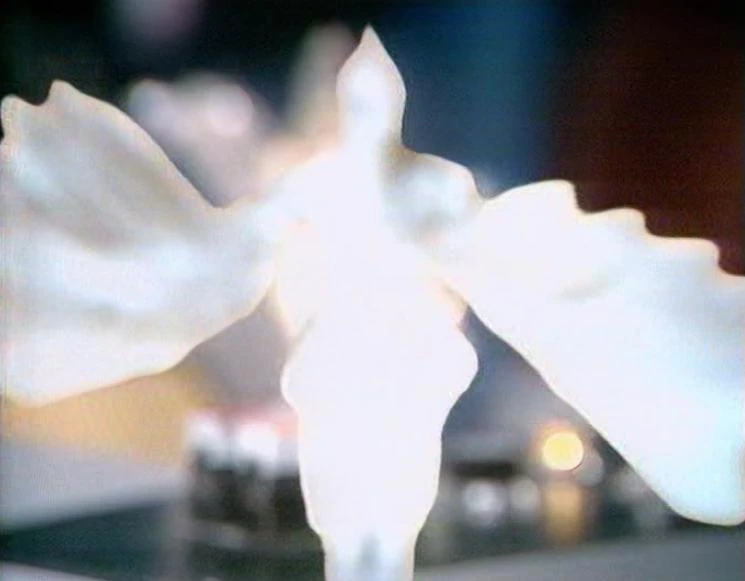
Sean: Honestly, you could just read No Future and get an actual good story alongside the god of time is a lady in a bird costume.
This episode, apart from being one of the two Classic stories I picked and know full well are stinkers (You all know exactly what the other one is and why I picked it), is notable for being the third time the sinking of Atlantis has been explained in Doctor Who. It is also the worst of the three without the manic glee of The Underwater Menace or the occult horror of The Dæmons. This is just crap.
Justin: Brb y’all
Sean: While they’re gone, let’s do Dr. Mysterio.
David: The Return of Doctor Mysterio is one of the small number of Who’s I watched prior to the project, and I even tweeted out my disappointment with it at the time. I was fully prepared to be even more let down this time, having seen the heights the series could ascend to, seeing this be how it handled its take on ‘Superman’.
Instead I was very, very pleasantly surprised! Much as BvS opened up for me in the Ultimate Edition with more Superman material also casting thematic light on Batman’s actions, understanding The Doctor as a character going in this time went a long way in making me understand how The Ghost/Grant Gordon, and by extension Steven Moffat’s conception of Superman, is meant to parallel them. Even given that yes, I’m still 99% sure the sum total of his exposure to the genre was Superman ‘78 and seeing a trailer once for a Batman movie.
Sean: That doesn’t surprise me in the slightest. Especially given the thing Moffat seems most interested in when it comes to the Superman dynamic: the fact that it’s a love triangle with two people in it. In some regards, Steven is perhaps the first writer in quite some time to come to the same conclusion as Elliot S! Maggin about the nature of that relationship: Superman loved Lois Lane. Lois Lane loved Clark Kent and ached in vain to believe he was Superman. Clark Kent loved Superman. No one understood this.
Otherwise, it’s a perfectly middle of the road Christmas special with not much going for it. It’s not bad, but it’s not as good as Last Christmas or A River Song Ending. Which makes it even more disappointing considering the context by which the episode came out. As I joked about last time, the showrunner for Doctor Who was supposed to be Chris Chibnall with the last Moffat era story being The Husbands of River Song. However, for a variety of behind the scenes reasons, Chris needed another two years to get ready for his time in the spotlight. As a result, Moffat had to scramble to make one last series and two Christmas specials.
As a result, this was the only episode of Doctor Who that came out in 2016. Doctor Who fans, being the sort to get extremely prickly when they get less than a thousand episodes a year regardless of quality, did not take this well.
David: Sounds about right. And it’s not as if ‘uhhhhhhhhhhhhhhhhh Superman, Superman’s there’ isn’t the sort of idea you come up with at the last minute. But aside from a bunch of fun bits - The Doctor’s utter befuddlement with the conventions of the superhero genre, Moffat’s origin story for a superhero being a wish come true powered by a star born of a child’s understanding of care, Charity Wakefield as Lucy Fletcher (maiden name being an LL initial!) having a genuinely perfect ‘Lois’ interrogation of The Doctor, the sonic screwdriver being used in the same capacity as Luthor’s sonic signal to Superman in ‘78, the simple fact of a little of the old magic coming back in a show where most of the time bullets don’t bounce off people - the episode is basically a compare-and-contrast of different stages of power fantasy.
The Doctor and Grant meet in a shared childhood idle of whimsical Christmas shenanigans and flight, but head off in different directions. The Ghost is here to fix everything in front of him (on what is by this series’ standard a relatively pette-ante scale), be the strongest, get the girl, always look cool. As weird and potentially uncomfortable as his situation with Lucy is, he genuinely seems to have not even considered what he’s gotten himself into until The Doctor spells it out for him. He’s a kid’s idea of what it means to be a man. Or, in his own words:
The Ghost: Adolescence was difficult.
Lucy: In what sense?
The Ghost: It went on a lot longer.
Lucy: How much longer?
The Ghost: I’ll let you know.
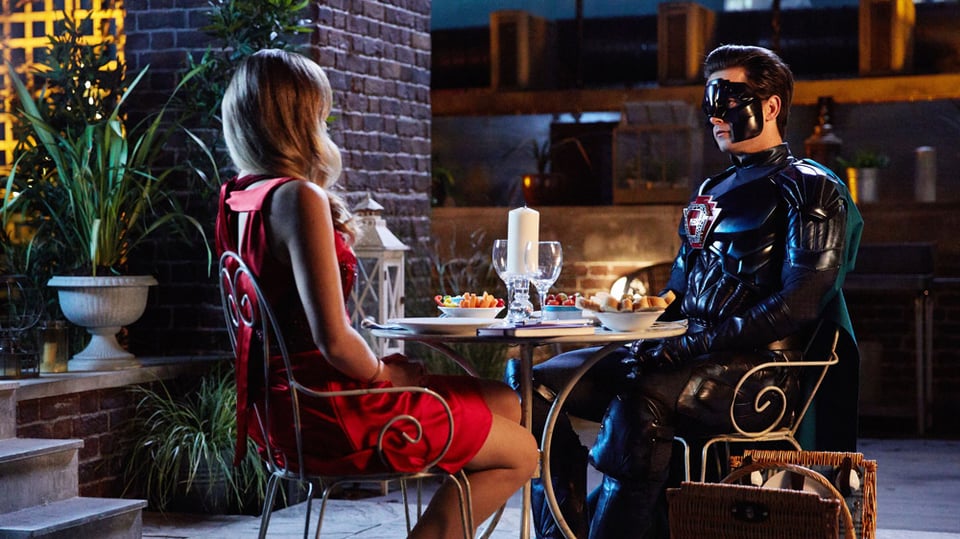
I get now why Moffat says Lois and Clark are his favorite romance of all time. The guy loves his Companions, and their role is to grow up - the ‘three’ of them are able to draw that out indefinitely, dangling forever on the delicate threshold of synthesis of identity and graduation to adulthood, just out of reach. He resolves it here, and thus as he sees it ends it. The Doctor by contrast is that ‘grown-up’ fantasy, clever and dorky and flawed and wise and focused on the big picture, the one who moves on. That he has Grant stop being a superhero isn’t because there’s actually going to be a major socioeconomic, military, cultural, global impact to one more weird thing happening in the world of Doctor Who, it’s because Grant Gordon - a nanny for the love of his life, both the ultimate Moffat simp and a job literalizing the idea of Superman as looking after the helpless - is the Good Man neither The Doctor nor The Ghost can be, and The Doctor would rather Grant stay that way rather than bear the burdens of his version of heroism.
“Be happy. I’ll look after everything else.”
Good for Chatwin by the way! Didn’t know it was him until the credits rolled, I guess this infinitesimally makes up for Dragon Ball Evolution. Baddies sorta sucked though, I guess they’re meant to be a bit ‘what if Lex was the one with an alien double-identity’ but it doesn’t land, though I got to feel like a smarty-pants seeing a bad guy with a faded but notable facial scar and knowing that this is Doctor Who so that bad boy’s gonna open up to reveal their alien stuff going on.
Sean: And so we go from that to an episode about lesbians being wet for one another.
David: The Pilot much more than Doctor Mysterio really comes across as Moffat dealing with an unexpected comeback, because it not only functions as a soft ‘relaunch’, it plays as him after resolving all his intended threads having to kick off a whole new thing and seeming to attempt to do his version of what RTD had to in 2005, down to outright titling this Pilot. Reintroducing us to the basic concept of The Doctor through an outside POV, culminating in a whirlwind tour of the setting’s touchstones and tonal extremes - there’s even a textual explanation for The Doctor having been away for awhile! It’s a nice, sort of cozy-feeling episode that immediately endears me to Pearl Mackie as Bill, the first Moffat companion whose relationship with The Doctor thus far doesn’t seem Incredibly Fucked (really the first period of New Who aside from I suppose Donna), and Nardole is…
Fine. He’s fine. I get why people hate him from the impression I’ve gotten, I don’t thus far but I certainly won’t evangelize for the guy either. He’s Fine.
Sean: Yeah, this is largely middle of the road Doctor Who. Not bad, not great. But perfectly fine. Bill is a lot of fun as a character best summed up as “Steven Moffat could not write her as a straight woman.” Nardole… gets some improvements later on when he’s not in the role of “No Fun” guy. But, as with all but literally one three companion teams, he gets the short end of the stick.
Justin: So I remember liking this one a lot more initially than ended up hitting me on a rewatch. It highlights for me what’s an interesting problem, both for episodic sci-fi in general and for Who specifically: the second act. The monster here is brilliant – sentient rocket fuel possessing or speaking through someone who’d rather be anywhere but here, which dovetails beautifully with Bill’s intro – but how do you make the legwork of solving the mystery as enjoyable as the revealed high-concept itself? Not sure they succeed here, and it gives me interesting flashforwards to the start of the Chibnall era, where we’ll see him try to introduce and capitalize on a similar amount of mystery-solving footwork, with even more tortured second-act results.
That said, Bill steps into the post-Clara role better than anyone could’ve been expected to, and you almost immediately forget how hard of a problem that should’ve been for the show. I adore the echoes of the Donna gambit that we see Bill pushing back against here – again, Moffat using the professorial angle to interrogate some of the choices of nuWho, which apparently RTD will do again soon.
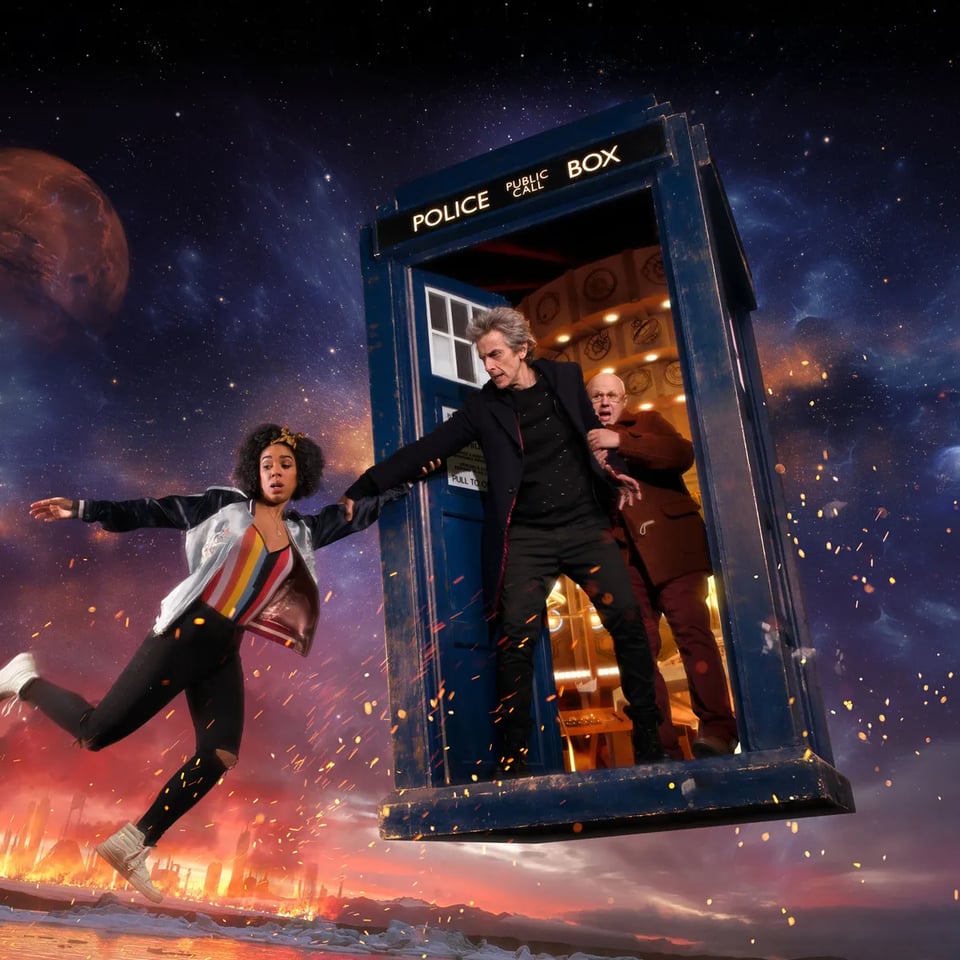
Also, in a vacuum, I love the idea of a potential companion rejecting one offer to traverse the cosmos in order to accept another. We’ve seen repeatedly – particularly with Smith but also a bit with the two Doctors before him – how the Doctor’s able to sweep big emotions under the rug and resort to dazzling reluctant companions with adventure rather than having tough conversations with them as an equal partner. Starting Bill off as the person who willingly turned down the adventure of her life with perhaps a love of her life is a really cool subversion of that, and I don’t recall the subsequent episodes doing much with it (before they absolutely have to as a finale for Bill) as they focus more on sending Capaldi off. What do y’all think of the sort of false Doctor offer Bill gets from Heather here?
Sean: I think a problem here is that Heather needs more time than we get with her. For the majority of the episode, she’s the hot girl Bill is into. We can see why they’re into each other as a relationship, but not so much Heather’s interiority. This could be shored up by a novelization that tells the events from Heather’s point of view. But in the episode, she’s a bit flat. Stephanie Hyam is extremely charming in the role, but that’s mainly on her. Sadly, future episodes don’t resolve this issue.
David: It makes sense to me as a difference between the ‘all-in’ nature of Heather’s proposition vs. The Doctor, already established with tethers to her day-to-day life, offering a version of adventure where they can get back before the tea’s ready. I wouldn’t call it fully-cooked though even given the overall ‘moving on’ theme going on with this Series, and I’m not shocked to hear it doesn’t really come around for awhile. The challenge of a companion whose relationship with The Doctor isn’t Incredibly Fucked is you gotta ask what the narrative is, and here the answer mostly seems to be ‘I have the one surprise season left, lemme see if I can make something a little more classic-feeling work.’ I don’t think Moffat’s wrong on that front thus far! But it is what it is.
Justin: There’s also, and maybe I’m reading too much into this, or just bitter about not leaving Bake Off to Noel Fielding, but – it seems like a weird no-confidence vote in Pearl Mackie to have Matt Lucas just hanging around? Putting him in a special is one thing, but it’s odd to see him still here in a proper season. I know that Moffat’s no stranger to a three-person Tardis but this doesn’t seem nearly as intentional as Amy-Rory-11, chemistry-or-narrative-wise.
Sean: It’s certainly not as bad as the vote of no-confidence in Martha, where Doctor Who spent most of the series whinging about Rose not being there anymore, but it is nevertheless odd. Especially considering the contents of the vault we all know is in there. If you’re going to have a three person team, why not have them instead of the perfectly serviceable Nardole.
Justin: in my headcanon, Missy regenerates into Noel Fielding before she gets back out of there.
Oh fuck i accidently david-spoiled. My bad.
David: I mean, I didn’t KNOW, but c’mon I sorta figured that was the most likely option.
Sean: They barely hid it, especially considering the Next Time trailer with Mim Johns cackling like a madman.
So anyways, I hear you have thoughts on Smile, Justin. I mean, it’s a perfectly decent horror movie with a bleak ending, but it’s no Barbarian or Nope.
Justin: I mean listen: when I was a young kid, the James Gunn Scooby-Doo movies came out, and instead of developing any one of a number of possible kinks, I came away with a deep-seeded appreciation of weird ornate set design. On a reptilian level, I like this one because it clicks and whirs and blinks and the monsters, visually, are creepy as hell while staying in that goofy zone. But I do also think that conceptually, there’s brilliance in one of the first post-human colonies building AI that can’t recognize or metabolize grief–especially given what 12’s trying to briskly move past–and then killing anything that manages to cry. Especially post-Covid, I think there’s still value and zing in a story about a society consistently yelling MOVE ON MOVE ON MOVE ON. Like, is this Midnight or Silence in the Library? No. But not every Doctor Who episode can be a Multiversity about unraveling the notion of the Doctor, and this is basically my platonic ideal of a speculative fiction installment – weird high concept, strange little guys, evocative visuals, playing somewhat with the ongoing issues of the main character. I love this one for the same reasons I love Gridlock, even if it isn’t quite as nutty.
Sean: Whereas my reaction the the James Gunn Scooby-Doo movies was “Fuck this, I’m sneaking into the theater across the hall and watching whatever’s playing there.” Both times, it was a football movie. James Gunn really didn’t figure himself out until the piano scene in Peacemaker and it’s our problem until Guardians of the Galaxy vol. 2. (It doesn’t really matter in Slither because that’s about horrible people. Guardians of the Galaxy, meanwhile, is hurt by tonal inconsistency and being rather mean spirited and cruel in banal ways.)
David: I liked the first Gunn Scooby-Doo! Even my parents liked it and they were not generally speaking Scooby fans.
Justin: Unfortunately, David is correct. I look forward to hashing this all out in our I hope upcoming newsletter feature I just invented without permission, Scoobywatch, which David emphatically will not do unless you tweet them @davidmann95. We’re covering Ghoul School, we’re getting into Captain Caveman, all of it.
Sean: I will join them and invite all my Scooby-Doo friends to go on extremely long tangents about California Gothic, The Haunting of Hill House, and The Haunted Mansion that are perhaps some of the best pieces of media criticism I’ve seen. I will also declare war on the fanbase by being extremely bitter about Mystery Incorporated being the Young Justice of Scooby-Doo and having no idea how Twin Peaks works. Also Red Herring is best character!
David: He is, but no.
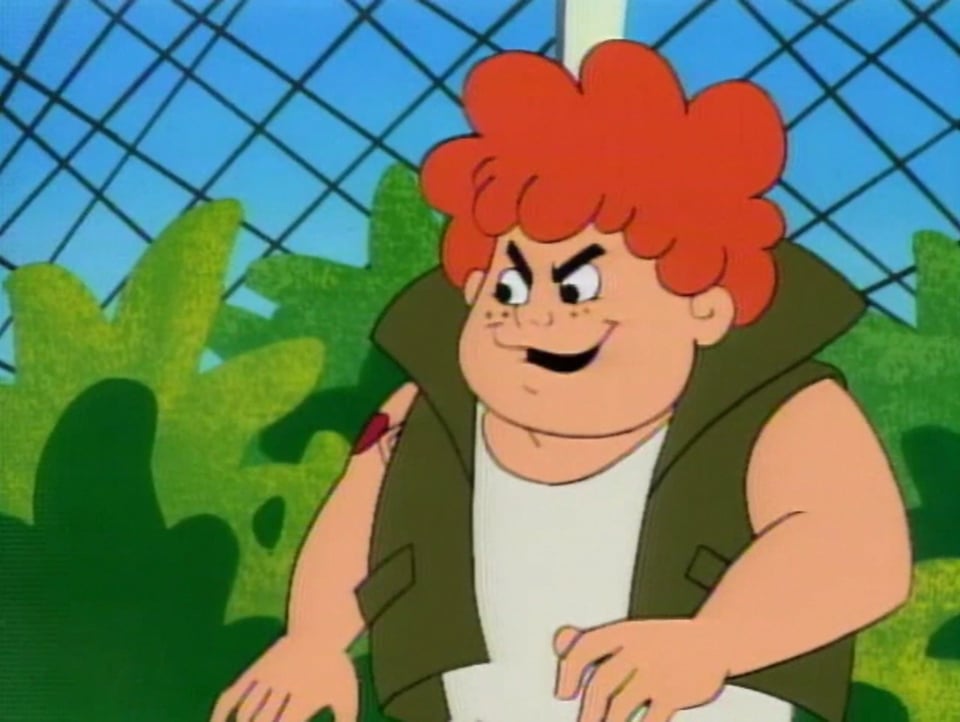
Sean: In any case, Smile is, in essence, a story about how the Hopepunk future is doomed to the cruelty you’d expect from a twitter discourse. A pity then that it’s written by a guy who is not young enough to fully explore the implications of emoji robots, Hopepunk, or a conception of robots that doesn’t involve them uncritically referring to them as slaves. As a result, it’s a bit mid.
David: A glimpse behind the scenes: we briefly discussed Justin initially appearing in this once again under the Max Headroom banner, only for me to physically yank him into the open when he started praising Smile. I ultimately didn’t hate it-hate it enough to make that routine worth it, it absolutely has some banger visuals and that goes a long way, especially paired with a fantastic opening. But when I noticed ‘wait this is by the writer of In The Forest Of The Night’ I concluded ‘well, some of the other writers I went on to like in this had stinkers, I’ll give ‘em a chance.’ This was a mistake. Buncha awkward faffing around culminating in a stunningly bizarre societal metaphor where The Doctor lobotomizes an emergingly sentient species and the happy ending is him and Bill lecturing humanity to get over genocide with a degree of smug self-righteousness putting The Zygon Inversion to shame.
(I went back and reread the transcript for that scene after Whowatch Part 17, and divorced from the transfixing power of Capaldi’s delivery, yeah that was grody as hell.)
Sean: Moving away from the grodiness, we have everyone’s favorite episode and (if we’re being honest) the second best story of this Series, Thin Ice. Doctor Who punches racists! Makes a speech about the importance of life over capitol. It’s great!
David: The beginning of the Doctor Who vs. Capitalism trilogy! I actually didn’t adore this as much as I understand a lot of people did, but yeah this is peak straightforward non-puzzlebox non-finale non-stunning miracle episode Who. Good character work, good setpieces, good weekly cast with a delightfully hissable villain, quality catharsis, real platonic ideal material. Definitely one of my favorite period piece episodes, which tend to land dully for me.
Justin: I think I like Oxygen a little more, but it’s a great problem to have to pick between which anticapitalist banger hits harder for you. Not much to say about it other than a. I will once again bang my ‘the Capaldi era is partially about reclaiming the show’s edutainment roots but making that process Not For Squares – I had no idea that frost fairs were a real thing and could go for a hundred thousand more episodes clearly based off of the writer spending too much time on Wikipedia or with an analog Britannica. Like this is my shit.
And also b. I dunno if it’s about new hires with a more cinematic eye, or having a bigger budget – Sean would know more than I do – but boy howdy, there’s something to be said for the show looking evocative now. We tend to argue that the cheapness of the show lends to its charm, maybe as a form of copium, but like – the shot of dive-suit Capaldi lit over the ice at night with just his sonic? Jesus Christ. You can get away with almost anything narratively if you’re able to look like a fairy-tale. I still remembered those scenes years later.
Sean: Justin, the answer to “Did Doctor Who get a larger budget” is always going to be “No.”
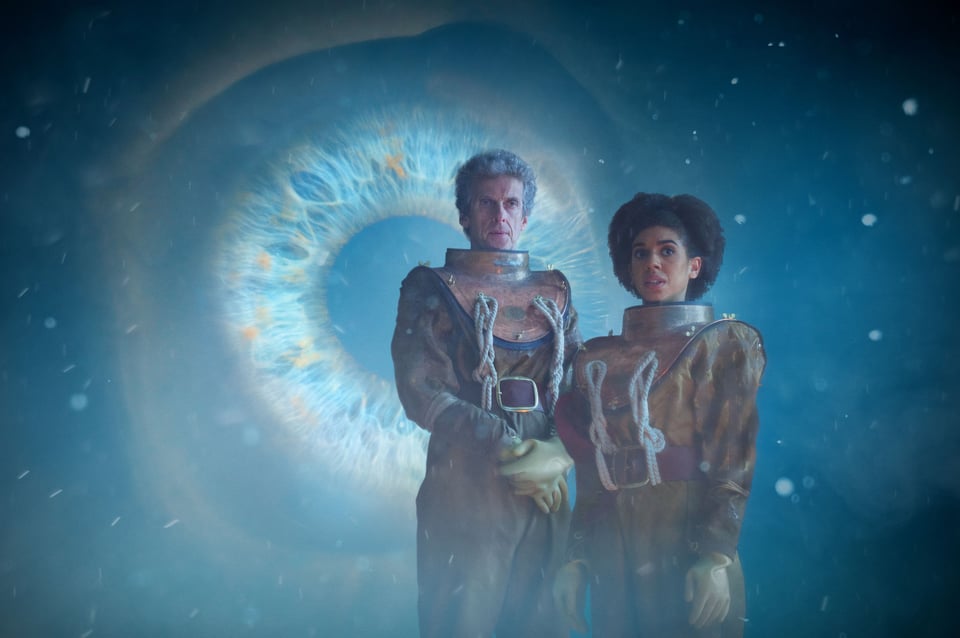
While Oxygen is amazing and usually my cup of tea, I think what ultimately makes this better for me is that there’s a creature lurking beneath the sea. For me, science fiction is in large part about talking about the issues of the world and discovering something strange and impossible. I love the bleak monstrosity of the endpoint of history. How capitalism will choose to devour the workers rather than pay them. How the only hope is to rebel against the system. I nevertheless have a soft spot for a strange cosmos. Of underwater creatures we barely understand existing alongside humanity. Of new life and new ways of living.
And Sarah Dollard is a true delight. The big speech is the obvious highlight, but there are others as well. The kid gang wandering the streets who ultimately get the upper hand at the end. The discussion of the historical whitewashing of culture that doubles as a middle finger to The Shakespeare Code. The scene where Bill questions Doctor Who’s morality and willingness to kill is one of the great chef’s kisses of the era. Pearl Mackie sells the hell out of it. It’s a scene that simply could not happen with any other companion that just makes me smile everytime I see it.
David: It’s really good! I hadn’t thought of it like that but you’re absolutely right, it needs to be someone who initially knew them through a lens other than ‘world-saving mercurial adventurer’ and also who isn’t Incredibly Fucked enough to immediately, fully buy in to that promise once it’s presented to them whatever happens along the way. It needs to be as close as you can get to a normal person hanging out with Doctor Who for them being disturbed by this to feel unforced.
Justin: To that point, I kind of love how this happens fairly early in Bill’s tour, and how also the script resists the urge to like, prove her wrong by the end or smack her down as a bleeding-heart idealist. It’s not as if we haven’t made gestures towards a companion with more morality than The Doctor before, but more often than not nuWho sends us to bed with a pat on the shoulder and a glass of warm milk, secure in the knowledge that The Doctor was right. Not with Bill. Yet another thing I’m realizing I miss like a limb come the Chibnall era.
Sean: But that’s for an increasingly oncoming time.
…Do we have any thoughts about Knock Knock?
David: I’ll maintain it’s technically the middle of Doctor Who vs. Capitalism since it turns out a landlord is stealing the vitality of the young in order to maintain a rotting edifice so he can be a big baby forever, but that sounds more interesting than it really is. I actually do like the episode just fine, there’s some decent ‘a haunted house…but DOCTOR WHO is there to help’ vibes in places, but nothing standout. I liked The Doctor materializing in Bill’s room to help her move though, I used ‘cozy’ as a descriptor before but that really applies here in a difficult-to-define way, sorta fanficcy in a positive way. The Doctor casually giving the episode a Classic-era title in Infestation of The Dryads was nice and reinforced what Moffat seems to be going for with this Series. Idk, it was alright.
Oxygen? Or did you already get to what you had to say on it, Sean?
Sean: It’s very much one of the great Doctor Who stories. I love it extremely dearly, even if I think the cliffhanger is a bit rough. (Especially considering where they go with it.)
David: The BIG stuff sells itself so hard it’s difficult to discuss without feeling redundant, but my favorite aspect of the seams showing with how a program like this works is the deal with the helmets. If they have to wear helmets throughout the whole episode, that’s a pain for the actors. If they never wear helmets, you don’t get the full spacesuit imagery. If there’s oxygen in the ship the whole time, that cuts down a lot of the tension. So: forcefield-helmets that don't work in actual space! Invisible, but they’re there the whole time! Honest! Charming as heck.
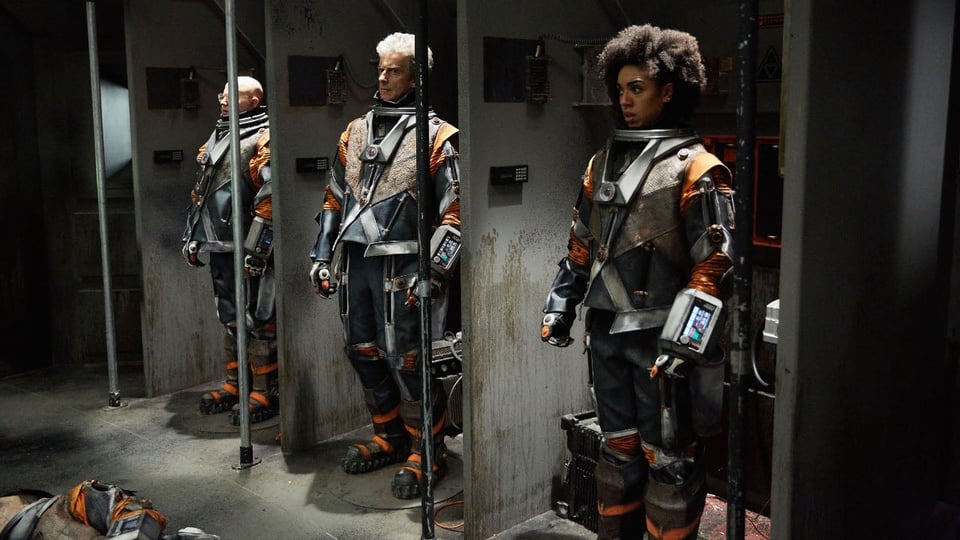
Justin: So I’m deeply skeptical of ‘character acquires a temporary disability’ stories, especially if it confers some sort of noble sacrifice on their part, and yet Oxygen/Extremis is a major peak of Capaldi and Who in general for me. I absolutely love how this starts as a Doctorless tragic love story, I love how the actual villains and their ideological rot are hidden deep, deep off-screen while we deal with a fringe consequence they couldn’t care less about (superhero comics: steal this technique!), I love the creepiness of the suits and how it’s left ambiguous how much the half-dead know/remember/see as their suits continue to act, I love the metaphor, and I love that somehow I never once think of this as a base-under-siege episode and fight the itch to click over to another tab, even though it totally is. Any idea how they did that?
Sean: By being really good at their jobs.
David: By having Doctor Who end capitalism forever but offscreen I’ll also say this falls in the Satan Pit category of ‘this is the episode where Doctor Who does the most important thing ever, but as a throwaway regular episode because they just have that much going on’, which always does it for me.
Justin: I also want to shout out the line of ‘humanity ended capitalism and then made another mistake’. As someone who had a brief rabbit-hole earlier in the year re: how it felt to live in communist countries (see: Svetlana Alexiovitch’s excellent oral history Soviet Time and Frances Spufford’s lightly fictionalized communist sci-fi non-fic Red Plenty), that really captured – in a throwaway line – the angsty optimism of knowing capitalism is doomed but also knowing that what comes next will be messy-while-worth-it.
Sean: Believe it or not, this isn’t even the first time Doctor Who has overthrown capitalism.
David: That shit keeps croppin’ up! Also, as someone who always instinctively holds their breath a little when characters onscreen have to do so? This one was rough. In a good way, but sheesh. The “health and safety” incredulity at the magnetized boots to make sure no one could be rescued along with the recurring “Your life is in our hands” line are some of the best horror the show’s ever done, too. And yet, somehow, despite nothing immediately concrete to point to that could’ve been worse, I’m sure something about the basic setup could’ve managed to be even more cynical if you’d made this episode today.
Sean: Especially in a post-COVID world where breathing became a major touchstone in work. Heck, a character of color being murdered because of her inability to breathe has a lot more charge now than in 2017, even if the events that led to that slogan happened in 2014.
Next Time: When I'm on a date, when that rare and special thing happens in my real life, do not, do not under any circumstances, put the Pope in my bedroom! Your tutor has strange dreams. His son is serving ten years in a labour camp for possession of a box of comics, so he's no fan of the Monks. In this scenario, the humans are the invaders. Why did he call you Grandad?
Hypothetical Distant Next Time, on The History Machine: The 13 Ghosts of Scooby-Doo, because You Demanded It.
Sean: If we’re doing this properly, we’re starting with The Mysteries Five. Maybe even The Archie Show.
David: VWORP VWORP VWORP vworp vworp vworp…